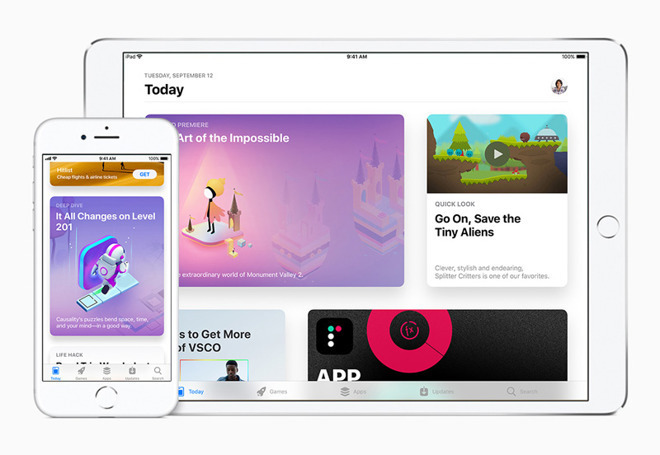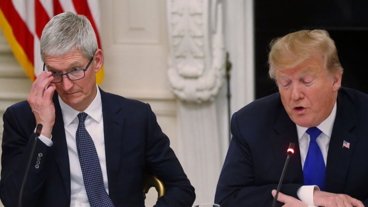The fallout from the U.S. Supreme Court's decision to allow an antitrust lawsuit against Apple over an alleged monopoly on iOS apps via the App Store won't immediately affect the company, suggests Morgan Stanley, but the legal threat could affect the stock value for years.
On Monday, the U.S. Supreme Court voted 5 to 4 to permit a 2011 case arguing the App Store was a monopoly that led to artificially inflated prices to continue, and to sue Apple over perceived antitrust issues. As to be expected analysts are starting to offer their reactions to the news, with Morgan Stanley suggesting it could have far-reaching consequences for the rest of the tech industry, not just Apple.
For the near term, there will be "no fundamental change to how Apple operates the App Store, nor is there any impact to Apple's profit and loss," writes Morgan Stanley in a note to investors seen by AppleInsider. The decision however will mean that Apple will face antitrust lawsuits from consumers and "potentially app developers," along with the added threat from complaints by Spotify to the European Commission, requiring Apple to plead its case in court.
Referencing how Apple management and other storefronts, including Google for the Google Play Store, have "vigorously argued that their App Store business model has solid justification," the analysts point out the 30% fee Apple applies to most one-time App Store transactions is on a par with traditional retail and commercial IT distribution markets, which operate at a margin of 20% to 30%. The firm also points to how Netflix is pushing consumers to download the app for free but handle the signup and payment process itself, avoiding the fee.
"It's highly likely that these eventual lawsuits take years to make their way through the US legal system, thus leaving a regulatory/legal overhang for the stock that first gained momentum when SCOTUS heard the case in late 2018," states Morgan Stanley.
Analysts see a "range of potential outcomes" for the situation, but stresses that a final outcome won't be expected for years. A best-case scenario is for any antitrust lawsuits to be quashed in the court, maintaining the status quo and validating Apple's arguments.
On a "bad but not the worst case" scenario, Apple loses lawsuits and pays monetary damages equivalent to the different between the price paid by consumers and the price determined by the courts to have been payable in a competitive market. The note references Apple's Supreme Court ruling for eBook pricing that involved a refund to consumers, of around $400 million, though uses it as an example of Apple paying a fine but retaining the business model.
The last worst-case scenario would "entail Apple modifying the App Store business model, either by lowering the 30% take rate they charge or opening up the iOS platform to include other, competing App stores."
The ruling would have far-reaching effects, with the Google Play Store likely to be equally affected by a decision, potentially opening Google up to lawsuits alleging anticompetitive practices, though the relatively small amount of revenue that Google earns from the store means there will be fewer stock implications if that happens.
For game developers and publishers, there could be an upside, as a forced reduction of the 30% fee could help make apps more attractive, or simply provide more revenue.
On a slightly less likely basis, other firms that receive commission for matching supply with demand, including online retailers, could face similar legal challenges. "We note, however, that unlike app stores on closed mobile ecosystems, most internet businesses operate in competitive markets with low/no barriers to entry," Morgan Stanley reasons.
 Malcolm Owen
Malcolm Owen

-m.jpg)






 Andrew O'Hara
Andrew O'Hara
 Wesley Hilliard
Wesley Hilliard


 Marko Zivkovic
Marko Zivkovic

 Chip Loder
Chip Loder
 Christine McKee
Christine McKee



-m.jpg)




11 Comments
So software went from costing multiple tens to multiple hundreds of dollars before the app store model down to single digits. Could someone explain where the inflated prices are? This has resulted in the general expectation that software costs less than it used to across more platforms than just iOS. The average price of most Mac software has also gone down as people are used to paying a couple of dollars for something on their phone and are less willing to pay the old style prices for software on their Mac. Software has always had these low, low prices on iOS so they can't compare the current situation to a previous one to justify the claim of inflated prices. They can only compare to the situation on other platforms where the prices were literally orders of magnitude higher, and have now seem to have come down some. I do not think that word means what they think it means!
The implications extends far beyond the App Store.
Why would this not apply to swag sold at Disney, or sports event, or other entertainment venues? Many entertainment venues use exclusive ticketing vendors who charge comparable markup.
Many retailers strictly control their suppliers and markup as well.
Apple's App Store may seem like a monopoly, because of the iPhone's high market share in the US, and the fact that the App Store has twice the revenue of Google Play. Globally iPhone is just 15% of the market. In China, WeChat is the market place for all Apps. Anyone can jail break an iPhone to get un-vetted Apps and lose Apple's security and warranty.
The Supreme Court has set a dangerous precedent that can empower intimidation lawsuits to on-line and off-line stores who may not have the legal resources to fight back. And how does anyone decide fair mark-up? 30% is not excessive for retail in general. Should the courts, rather than Apple, decide which Apps are safe? And which Apps are ripoff copies of other Apps? Can I force Macy's to sell fake knock-off of Levi's?